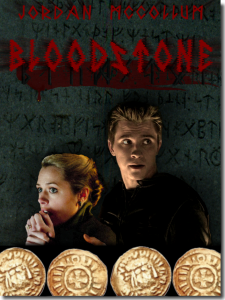Once upon a time, I was anti-mock covers. I thought it was a little weird to put up a fake book cover on your site for a book you’re drafting or trying to sell. Then I wrote up my projects page, and it looked . . . bare. So I made up some passable mock covers (some obviously more time consuming than others).
Usually, I’ve waited until I was done or nearly so to make these. But since October was a “planning” month for NaNo, and I was only doing 50,000 other things, I spent a day making the “ideal” version of the cover:
Not 100% perfect (or, you know, licensed), but pretty dang good. Just looking at it gets me excited to write!
Obviously you don’t want to take off a day in the middle of NaNo to play around with a graphics program to make a cover no one else might ever see—but in about 20 minutes, you can throw together something that can inspire you.
Seriously, I tried it. I used a picture I pinned of one character, and Googled screencaps from a movie the other character was in (screencaps found here). Then I turned to Flickr for pictures of a rune stone (by Paul W. Locke). Some Magic Wand tool, cut/paste, resize, color balance, and add text, and voila! I put together a crude version of the above.
Inspiration in twenty minutes? That’s a bargain.
How do you find inspiration quickly?
Photo credits: Maggie Lawson by unknown (via listal), Garrett Hedlund from TRON: Legacy (found here), Viking coin by Ancient Art, Kensington runestone monument by Paul W. Locke





